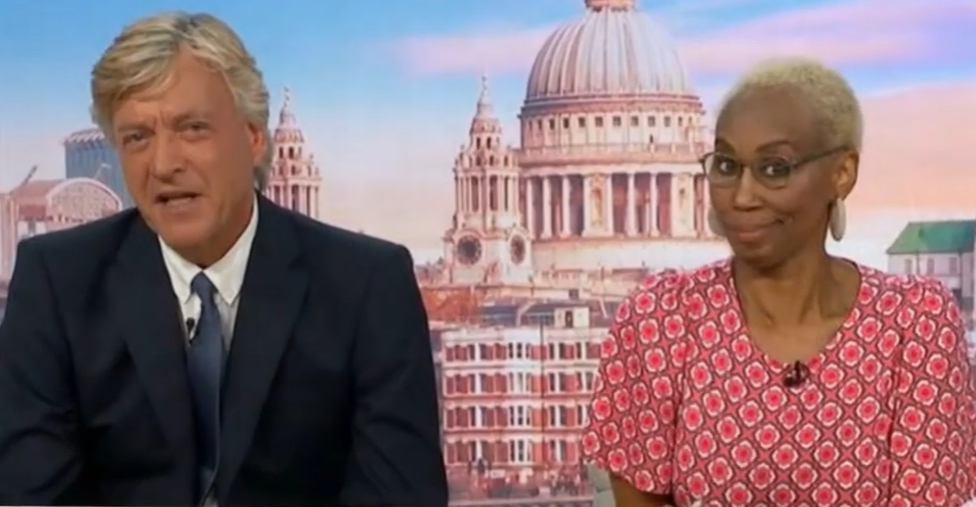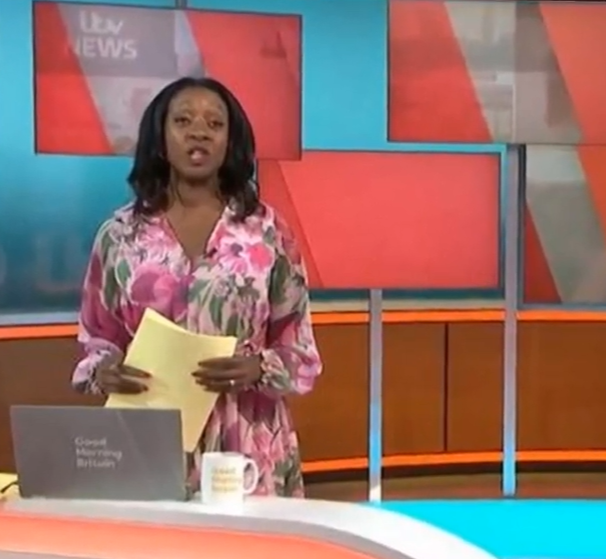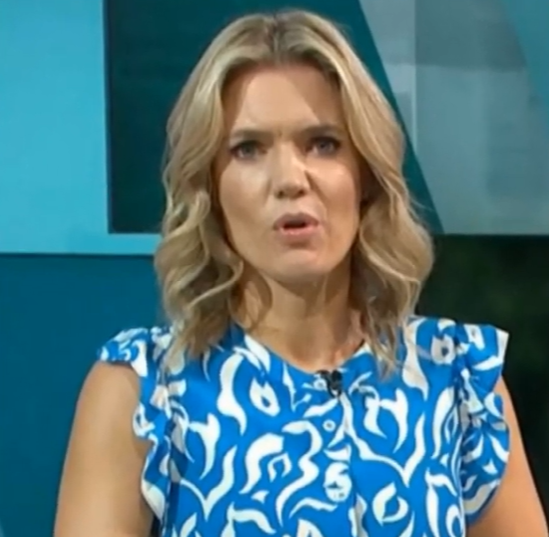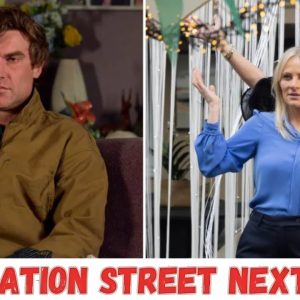In a stunning turn of events that sent shockwaves across the nation, ITV’s beloved morning staple, Good Morning Britain, was abruptly halted for an emergency breaking news report, plunging its typically vibrant studio into a somber silence. While the immediate focus was a harrowing tragedy unfolding halfway across the world, the broadcast’s perceived oversight of significant domestic events ignited a firestorm of outrage among viewers, leaving a lingering question mark over the ethics of national news coverage and the shifting sands of public expectation.
The drama began to unfold during a seemingly routine broadcast, with main presenters Richard Madeley and Charlotte Hawkins guiding viewers through the morning’s headlines. The atmosphere, usually a lively blend of current affairs, celebrity interviews, and lighthearted banter, suddenly shifted. A palpable tension descended upon the studio as Marvarine Cole, the day’s news anchor, was called upon to deliver an urgent, unscheduled update. Her demeanor, stark and grave, instantly signaled that this was no ordinary news bulletin.
“I’m bringing you some breaking news now,” Marvarine announced, her voice resonating with an uncharacteristic solemnity. “Two police officers are reported to have been killed in a shooting in Australia, according to broadcasters there.” The words hung heavy in the air, painting a chilling picture of distant violence. She further elaborated, revealing the alarming detail that the shooter remained at large in the Australian state of Victoria, intensifying the sense of a live, unfolding crisis. The immediacy of the report, interrupting the flow of a show deeply embedded in the rhythm of British mornings, underscored the gravity of the situation.

As the program progressed, Marvarine returned with a more detailed, and even more alarming, update. “Police in Australia are responding to an active shooter,” she informed viewers, her tone conveying the urgency of the situation. The previous report of two fatalities was tragically confirmed, with the added devastating detail of another officer sustaining injuries. The response from Australian authorities was described in stark terms: “Dog squads, armored vehicles, and tactical teams have been deployed.” The scale of the threat was further emphasized by the news that “schools and all public facilities have been locked down,” transforming ordinary Australian communities into scenes of fear and emergency. The incident, unfolding thousands of miles away, momentarily gripped the nation, drawing focus to a remote yet profound human tragedy.
However, as the broadcast dedicated its resources to covering the Australian tragedy, a very different kind of storm was brewing closer to home – a storm of public fury erupting across social media platforms. Viewers, initially absorbed by the unfolding drama, quickly shifted their attention, not to the news itself, but to what they felt was a glaring omission from Good Morning Britain’s coverage. The core of their outrage stemmed from the perceived selectivity of the news agenda: how could a national broadcaster interrupt its flagship show for an international incident, no matter how tragic, while allegedly sidelining a string of significant and deeply concerning events that had just unfolded in the heart of London?
The events in question were those of the Notting Hill Carnival, which had taken place over the preceding weekend. Far from being a mere cultural celebration, the Carnival had been marred by an alarming wave of arrests and serious incidents. The sheer scale of the disruption was staggering: a total of 423 people were arrested over the weekend. These were not minor infractions; the charges included 46 arrests for carrying an offensive weapon, highlighting a dangerous undercurrent to the festivities. Furthermore, two people had been stabbed, with incidents reported at Pace Terrace and in Oxford Gardens, though thankfully, police confirmed these injuries were not life-threatening.

The picture of the Notting Hill Carnival painted by these statistics was one of widespread disorder and serious criminality. The Metropolitan Police had, by Monday evening, made a total of 223 additional arrests, with 177 occurring at the Carnival itself and 46 on its immediate approaches. A closer look at the nature of these arrests reveals a community grappling with profound challenges: 32 arrests were made for assaults on police officers, a deeply troubling statistic that speaks to direct attacks on law enforcement. Beyond the weapons charges, 18 arrests were for sexual offenses, 146 in relation to drugs, five for robbery, four for violence with injury, and 36 for other acts of violence. This comprehensive list of infractions underscored the significant public safety concerns and criminal activity that had shadowed one of London’s most iconic annual events.
It was this stark contrast – the immediate, dramatic coverage of an international shooting versus the apparent silence on such widespread local disruption and violence – that ignited the fuse of viewer outrage. Social media platforms became a digital town square where furious GMB viewers vented their frustrations, their posts echoing a collective sentiment of betrayal and disbelief.
“Not reporting on the 400 arrests and multiple stabbings at a festival in London, but reporting on a shooting on the other side of the world. Strange that,” fumed one viewer, encapsulating the sentiment of many. The accusation was clear: a perceived double standard, a questioning of the editorial judgment that prioritized distant tragedy over immediate, domestic peril.

Another echoed this sentiment, adding a layer of skepticism about the broadcaster’s overall agenda: “Wonder why Marverine isn’t reporting arrests at London Carnival at GM only tell us news they want us to hear like water shortage in Scotland. How many people there watch GM?” This comment not only highlighted the perceived omission but also accused GMB of deliberately curating its news to suit an undisclosed agenda, rather than reflecting the full spectrum of public interest. The sentiment suggested a feeling of being patronized, of being fed only the narratives that fit a particular editorial line.
A third, more vitriolic post, channeled raw, unedited anger: “What happened at Nodding Hill Carnival 2025 over the weekend? I’m not interested to hear from an idiot that’s done more damage to this country than anyone.” While the “idiot” comment might be seen as extreme, it served as a vivid illustration of the intense emotional response and deep-seated frustration felt by a segment of the audience, who perceived the lack of coverage as a dereliction of journalistic duty, ignoring pressing local concerns that directly impacted their lives and communities.
This dramatic juxtaposition of tragedies sparked a broader, more profound debate about the very nature of news. What defines “breaking news” in an interconnected world? Does geographical proximity dictate significance? Or should the sheer scale of incidents, even if less immediately fatal, warrant similar national attention? For many viewers, the Notting Hill Carnival represented a critical local issue, directly impacting public safety, community relations, and the visible presence of law and order in their capital. To see it, in their eyes, downplayed or ignored in favor of an international story, however tragic, felt like a disconnect from their immediate realities.

The Metropolitan Police, in their subsequent statements, did attempt to contextualize the Carnival incidents, noting that they had “seen far fewer incidents of serious violence than in recent years.” However, they also cautiously acknowledged that the event was “still in its latter stages and is not being at all complacent.” This official stance, while aiming to reassure, did little to quell the brewing outrage among those who felt the initial media coverage had been inadequate. For critics, the police’s statement, while perhaps factual, didn’t negate the significant number of arrests and serious crimes that had occurred, and which they believed warranted more prominent national attention.
The Good Morning Britain incident, therefore, transcended a mere news report; it became a microcosm of the complex relationship between broadcasters and their audience, a real-life drama playing out on screens and social media feeds. It served as a potent reminder of the power of media to shape perception, and the intense scrutiny it faces in an era where every decision, every omission, can be instantly challenged and debated by a vocal, engaged public. As the dust settles on this intense media moment, the questions linger: What truly constitutes “heartbreaking news” in the modern age, and how will national broadcasters navigate the ever-present tightrope walk between informing, engaging, and satisfying an increasingly critical audience? The outrage expressed by viewers signals a clear demand for accountability and a broader, more inclusive approach to the stories that dominate our screens.





